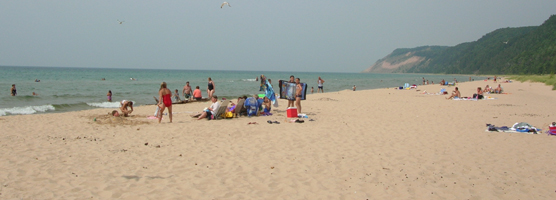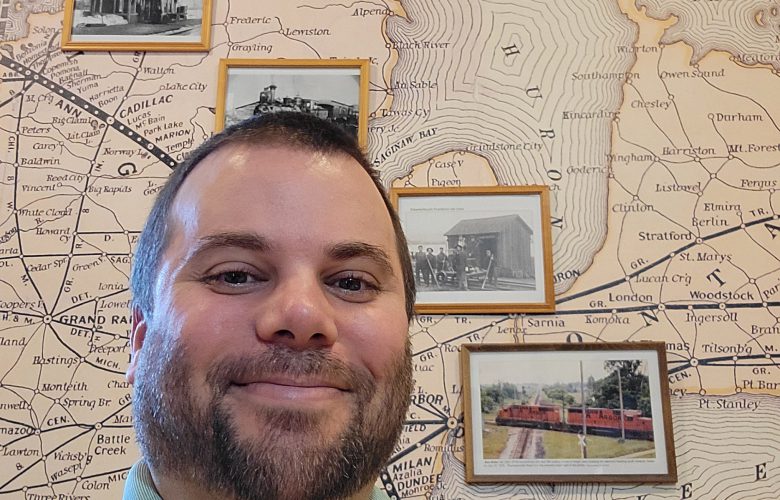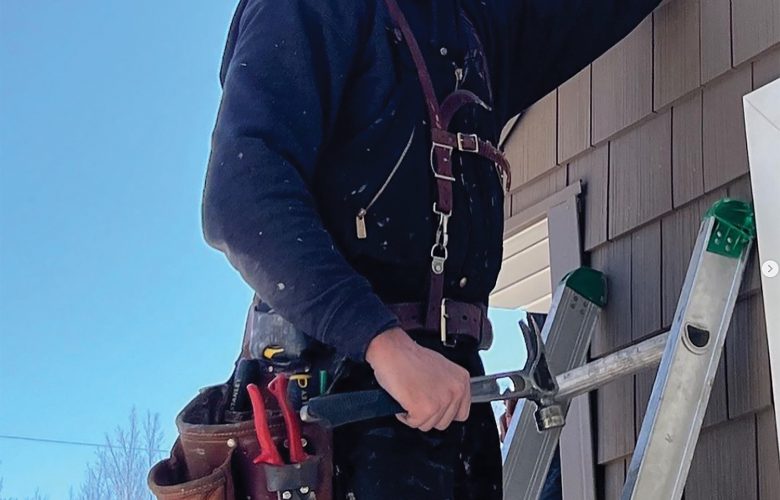After decades of missteps, how the Park is winning over the local community
Before the end of this year, Congress may approve “wilderness” legislation for the Sleeping Bear Dunes National Lakeshore that — despite the implication of the word — would forever guarantee public access to the Park’s pristine beaches along county roads, to historic manmade structures, and continue to allow hunting and fishing within the Lakeshore.
The measure has the support of Park officials, citizens and lawmakers on both sides of the political aisle, and represents a potential win-win for all parties. Representative Dan Benishek, (a Republican who represents Northern Michigan) sponsored the “Sleeping Bear Dunes National Lakeshore Conservation and Recreation Act” (H.R. 163), whose companion legislation in the Senate (S. 23) was championed by Michigan Democrats Carl Levin and Debbie Stabenow and passed the senior chamber on June 19. The House bill must pass the Committee on Natural Resources before it will get a floor vote. Once the legislation passes both houses of Congress, support from President Obama is all but guaranteed.
“The only challenge, frankly, is getting other lawmakers to understand that this is actually a limitation on federal policy, and not the other way around,” Benishek told the Glen Arbor Sun last month. “The only hurdle left is the legislative process.”
The “Conservation and Recreation Act” represents the latest chapter in the Park’s constant dance between the needs for both preservation and recreation. The legislation seeks to permanently correct previous Park guidelines that, all parties now agree, were seriously flawed.
Here’s the backstory: a 1981 Wilderness Study by the National Park recommended that the Sleeping Bear Dunes National Lakeshore, which 32 years ago was still in its infancy, attempt to acquire all county roads within the Park and zone them as “wilderness”, thereby keeping out all motor vehicles and heavy foot traffic from such cherished Lake Michigan beaches as Port Oneida, Good Harbor and Esch Road.
The full implications of that Wilderness Study didn’t surface until 2002 when Lakeshore officials proposed a General Management Plan (GMP) that, in keeping with the ’81 recommendation, would close county roads to the public, potentially demolish historic structures such as barns, and also push fishermen and hunters off the land. By 2002, though, Glen Arbor and other communities surrounding Sleeping Bear had grown into booming destinations for tourism and recreation and were entirely dependent on those beaches, those iconic symbols, and those resources. Shutting much of the Lakeshore to those public uses could have dealt a devastating blow to our towns and townspeople.
Reaction to the 2002 GMP was swift and angry. Public meetings at Lakeshore headquarters in Empire were swarmed by the impassioned masses; Park interpreter Bill Herd told the Sun that the Lakeshore’s push for wilderness was being done behind the backs of the public, and without the basis of any concrete scientific studies; meanwhile, Beulah resident Jeannette Feeheley and other concerned citizens formed the advocacy group “Citizens for Access to the Lakeshore” to fight the Park’s General Management Plan.
As Feeheley pointed out during her testimony to Congress this past summer [Read her testimony here: FeeheleyWildernessTestimony07-23-13], “this Park had not originated with vast amounts of never-used or never-privately-owned land, but of land that had been mostly held and used by small, private landowners for two centuries … In order for the Park to become a reality, most of those private owners had to be removed from their land after the 1970 enabling legislation was passed.” In other words, the Park was trying to turn back the clock and create wilderness where wilderness hadn’t existed for many decades.
Worse, the 2002 GMP debacle threatened to unravel much of the hard-earned trust that the Park had built with local citizens after the contentious and painful early days of the National Lakeshore, when local families were forced off their land through federal use of eminent domain to take their land for the new Park.
In response to the public outcry, then U.S. Secretary of the Interior Gale Norton withdrew the proposed GMP in October 2002. According to Feeheley, the Sleeping Bear Dunes National Lakeshore made a dramatic about face, and her group soon found a receptive ear in new Sleeping Bear Superintendent Dusty Shultz, who “devoted much staff time and resources to learn why the community was so alarmed and why the (Park) had been so taken by surprise by the outrage.”
In 2002 the National Lakeshore also imported Tom Ulrich (now Deputy Superintendent) from Florissant Fossil Beds National Monument in Colorado. Ulrich proved to be a skilled communicator with both local media and the public at large. “Ulrich was not sent for window dressing or simply to smooth ruffled feathers,” Feeheley told Congress. “Instead, we found him to be a dedicated public servant who was committed to listening to the concerns of the agency’s stakeholders and who adeptly helped establish a working relationship among what had become, by that time, two distinct adversaries: the National Park Service vs. the surrounding local communities.”
The following seven years represented a thaw in Park relations, with the Lakeshore showing greater transparency as it sought more public input. Under Shultz and Ulrich, the General Management Plan process was restarted in 2006, and the 2009 GMP and Wilderness Study sought to explicitly delineate between areas that should remain wilderness, such as the Manitou Islands and areas of the mainland that are treated as wilderness, while leaving local county roads, beaches and historical structures open for public recreation.
The Park’s current management believes those destinations should remain open to the public. But what happens, asks Feeheley, if Shultz and Ulrich leave, and the Sleeping Bear Dunes National Lakeshore takes another direction 10 years from now? Or if a new Secretary of the Interior under a subsequent U.S. President decides to impose stricter wilderness laws? “Right now the Park sees the wisdom of involving local stakeholders,” Feeheley told the Sun. “They have learned that they need us as much as we need them, whereas for the first 30 years of the Lakeshore’s existence, it was the Park Service against the local community.
“The problem is the future.”
If the federal government passes wilderness legislation in Sleeping Bear, citizens will experience very little change. A signing ceremony will likely take place, but no trees will fall in the forest, no beach sand will shift. “It’s almost symbolic in a way,” says Ulrich. “But I think it’s critical. Without it, you’ll have ongoing institutional tension between the Park Service and the communities … because we’d still have a law on the books that encourages us to acquire country roads.”
For Congressman Benishek, a doctor from Michigan’s Upper Peninsula who was elected to the House of Representatives during the 2010 Tea Party wave elections, the Sleeping Bear Dunes National Lakeshore Conservation and Recreation Act is an opportunity to stamp his name on a law that has strong bipartisan support, like very few issues today in Washington, D.C. It’s also an opportunity for this “do nothing” 113th Congress — rated the most unpopular Congress in 40 years by a recent Gallup Poll — to resume passing wilderness legislation. (The Republican-led 112th Congress, under House Speaker John Boehner, was the first Congress since 1966 not to protect a single acre of U.S. wilderness.)
The Conservation and Recreation Act may also be an opportunity for Benishek to placate some of his right-wing constituents who elected him to office. At a raucous Aug. 23 town hall meeting at the American Legion Hall in Traverse City, Benishek faced an overflow crowd that repeatedly expressed anger with his performance in Washington. In the same breath, they called upon “Dr. Dan” to de-fund the government in order to defeat President Obama’s Affordable Care Act, and to simultaneously use federal resources to build a bigger wall at the U.S.-Mexican border to keep out “illegals”.
If townhall meetings are an indicator, Benishek’s political future faces a larger threat from the angry right than it does from the few liberal protestors who attended his Traverse City gathering. When asked what bipartisan legislation he has championed, Benishek appeared relieved at the question, and seized upon the opportunity to discuss the Conservation and Recreation Act as well as a bill he introduced in May with Democratic Senator Kirsten Gillibrand to stop sexual assaults in the military.
The wilderness legislation overcame perhaps its only political hurdle on July 23 when Benishek (with the help of Jeannette Feeheley’s testimony) appeared to convince his Republican colleague Rob Bishop of Utah, who chairs the Committee on Natural Resources’ Subcommittee on Public Lands and Environmental Regulation, that the Sleeping Bear Dunes National Lakeshore Conservation and Recreation Act would limit National Park power, and not expand it. In Utah, home to five national parks, Bishop has long advocated for individual ownership of public lands.
“The bill is a win/win for proponents of wilderness and conservation as well as proponents of public access and varied recreation usage,” the Beulah native concluded in her testimony to Congress. “It is not a bill where the proponents give grudging, reluctant support, feeling compromised and unhappy about something. Rather, this is a bill wherein almost everyone involved has emerged quite satisfied.”
Following her testimony, Bishop complemented Citizens for Access to the Lakeshore and the people of Michigan for initiating this legislation at the grassroots level, and not from inside the Washington beltway. “The Park Service giveth, and the Park Service taketh away. I just want to make sure there are strict guarantees in this language that maintains beaches, maintains roads and maintains trail systems.”
View a video of Jeannette Feeheley’s testimony to Congress here (Congressman Benishek begins testimony at approximately the 40-minute mark):




